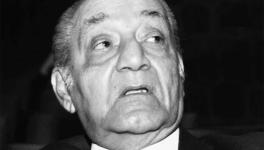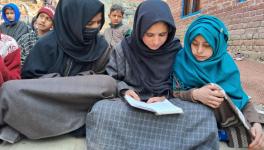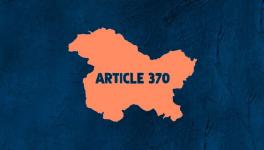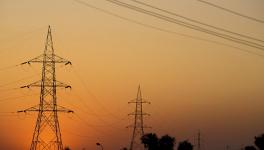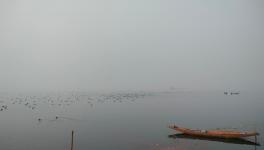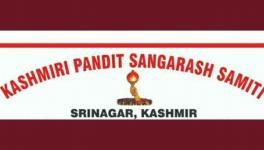Rationality is Missing in Delimitation Exercise in Jammu and Kashmir: M.Y. Tarigami
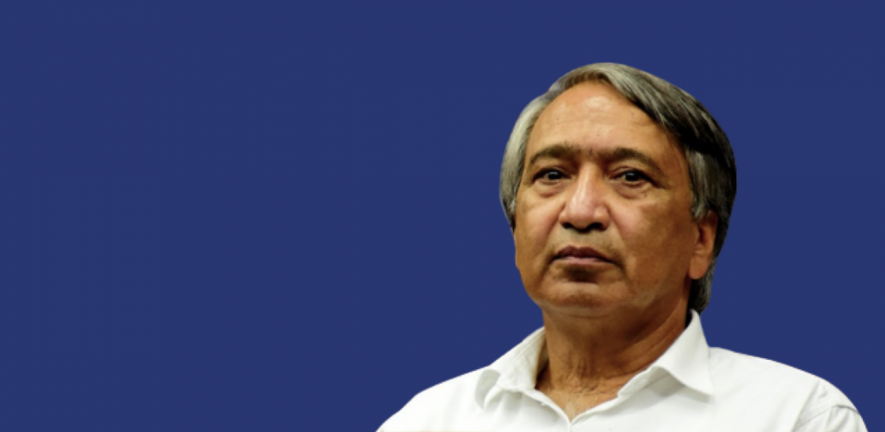
THE Jammu and Kashmir Delimitation Commission notified its controversial delimitation -award for the union territory of Jammu and Kashmir earlier this month.
The Leaflet spoke at length with Mohammed Yousuf Tarigami on the Delimitation award. Tarigami is a Central Committee member of the Communist Party of India (Marxist), Convenor and Spokesperson of the People’s Alliance for Gupkar Declaration, a conglomeration of key political parties of Jammu and Kashmir, and a four-time legislator representing Kulgam in Jammu and Kashmir Assembly. He has been a vocal opponent of the delimitation commission’s allocation of seats since last year, when its draft proposal was published.
We spoke with Tarigami regarding his opposition to the allocation of seats done by the Delimitation Commission, and why he questions the legitimacy of the delimitation process itself.
Edited excerpts from the interview are as follows:
Q. What are your primary objections to the delimitation award for Jammu and Kashmir that was made on May 5?
A. The first thing we must understand is that the Delimitation Commission of both Parliamentary and Assembly constituencies are put on freeze by the 84th Constitutional amendment in 2002. Accordingly, here in Jammu and Kashmir, the then state assembly of J&K amended the J&K Constitution itself. The amendment suggested that the delimitation commission will be carried along with the rest of the country after the 2026 Census. This was the Assembly’s recommendation. That was challenged at the High Court, and at the Supreme Court as well. Both the High Court and the Supreme Court upheld that decision of the J&K legislative assembly.
When the J&K assembly wanted the delimitation process along with the rest of the country, they are separating us from that process. What is the hurry?
On the one hand, you see that the present dispensation, Bharatiya Janta Party [BJP}, claims the integration of J&K. On the other hand, when the J&K assembly wanted the delimitation process along with the rest of the country, they are separating us from that process. What is the hurry?
Secondly, every delimitation process has the basis of population. That is why it is conducted after every census. Census is the basis, and the census is a measurement of the population, not of mountains, rivers or topography. But here in J&K, it was not done on the basis of the Delimitation Act, 2002. Rather, it was done under the purview of the Jammu and Kashmir Reorganisation Act, 2019, which we think has been arbitrarily enacted by the Parliament. Its constitutionality has been challenged at the Supreme Court which, as believed by most political parties here in J&K, is not in accordance with Constitutional provisions.
Also read: Parliament passes Bill to bifurcate the State of Jammu and Kashmir
By the Reorganisation Act, they have dismembered J&K into two union territories, without referring to the people of J&K, and without holding any discussion or debate with the population here. In that Act itself, they’re asking for delimitation, and they’re deciding the size of the seats in the J&K union territory, whereas the Delimitation Act empowers the Commission itself to determine the size of the constituency in a particular region where the delimitation process has to be instituted. And then, its mandate is to fix the boundaries of the assembly segments.
In this case, seven seats have been increased not under the purview of the Delimitation Commission, depriving the Commission itself from its own authority of determining the size of the particular region.
It is not being explained by the Reorganisation Act itself how they increased the number in the J&K union territory. There has to be some basis, some criteria. Why seven? There is no explanation. It is unprecedented. It is a dangerous turn.
Here in J&K, we are opposing the Reorganisation Act because the people of J&K were not consulted. Nor had it been debated in the ranks of either Jammu or Kashmir or Ladakh. There was total lockdown in those days, and a virtual clampdown on communication networks as well. Political leaders were curbed and detained. So, the Government of India divided and downsized us without even referring to the population. The Constitutional mandate was unfortunately not followed, which is why we have challenged it. That is why we believe that the Reorganisation Act and the delimitation process are not within the Constitutional framework.
Also read: Towards a political paradise of caged parrots
I have moved an application at the Supreme Court for early hearing of the petitions, asking for hearing of the applications regarding the August 5, 2019 decision regarding the Constitutional provisions relating to J&K like Articles 370 and 35A. We have suggested that the Government of India has continued to take decisions unilaterally. These decisions will be irreversible after some time. I have cited the example of constituting the delimitation commission itself. This is our position.
44 per cent of the population, in Jammu, will get 48 per cent of the seats here, whereas Kashmir, with 56 per cent of the population, will get only 52 per cent share in seats. This arrangement will create a sheer disparity in regional representation.
Now let us see what they’ve done. The question is that the population they have taken is as per the 2011 Census. Open up the 2011 Census and see the population. The Chief Election Commissioner has said that the union territory of J&K is one unit. But then why are you are talking about Kashmir and Jammu and Ladakh? It is one unit, yes. But there are separate districts and divisions there as well, and this is an admitted fact. We admit that Jammu, Kashmir and Ladakh are one unit. Why, then, in certain areas, they have increased the number by six? Why not in Poonch, for instance? That is in Jammu region. Why not in Ramban, which is also in the Jammu area? Why have they increased the numbers in those areas which suited a particular political party? This is our question.
Now take the 2011 census. The population of Kashmir region is 68,88,475. Jammu has a population of 53,78,538. The question is that the Commission has allocated six seats to Jammu and only one seat to Kashmir. Now Jammu will have 43 seats whereas Kashmir will have 47 seats in the Assembly of 116 seats, because 20 seats are reserved for Pakistan-occupied Kashmir. So, 44 per cent of the population, in Jammu, will get 48 per cent of the seats here, whereas Kashmir, with 56 per cent of the population, will get only 52 per cent share in seats. This arrangement will create a sheer disparity in regional representation.
The recommendations of the commission are completely in line with the BJP’s policy of creating electoral space for the ruling party, as most of the seats were carved out in Hindu-dominated areas of Jammu region. I’m sorry; I’m not a believer of looking at people and things as Hindu-Muslim-Sikh but unfortunately, as the situation exists today, we are forced to evaluate the recommendations on the basis which they have taken into consideration. They have virtually evaluated or carved out the constituencies on the basis of Hindu/Muslim. That is unfortunate for us. So, overhauling the existing territorial constituencies has significantly tempered down the electoral representation of Muslims in the Jammu region also.
They have created some seats in the Chenab Valley Region. In Kishtwar area, one new constituency – Padder, with only 51,279 population – has been created, while in Muslim-dominated Poonch district, Surankote constituency, having almost similar terrain, has around 180,000 population, but no new constituency has been created there. Our objection is that constituencies should not be carved out on the basis of religion. It will divide the ranks of the population. Our Constitution has given every citizen the right to vote on an equal representation basis – one vote, one person. It doesn’t envision that one person would be more important than another.
Of course, geography and topography have to be given some consideration. How did they carve out another Parliamentary constituency which is part of Jammu region and part of Anantnag in Kashmir region? On what criteria has the commission created a new parliamentary constituency? Ask anybody – there is no connectivity between Kashmir and Poonch-Rajouri and Anantnag-Kulgam except one, that is, Mughal Road which remains cut off for several months in winters. The road is via Shopian, which is now part of Srinagar Parliamentary constituency. What kind of wisdom has the Commission applied, one wonders.
We don’t understand what the designs are. The general feeling in Kashmir and a sizable section of the Jammu region is that the approach itself is divisive and disruptive.
It is harmful for the political unity of J&K. It will create more suspicions to the advantage of those who have been desperately trying to undermine the relationship of the people of J&K with the Union of India. This is quite harmful for the interests of the country as a whole. Jammu, Kashmir and Ladakh are different regions, with distinct communities and linguistic groups. It is only the free and fair democratic process which can strengthen the unity of the people. But when the democratic process itself becomes suspicious, doesn’t it harm the interests of the population of each community and each region, and of the country?
That is why we feel that this exercise itself is not in accordance with law, with the mandate of the Commission and with the Constitutional framework, and must be rejected.
How do you think the Delimitation Commission’s report furthers the interests of the BJP and helps fetch them electoral gains?
A. Jammu has a large Hindu population. With this interest in mind, they carved out six territorial constituencies from the region. It is not necessary that the people will oblige them, but the point is that there is an attempt to target that. The effort is towards that end. I am of the opinion that we have to be integrated with Indian democracy – ‘we’ means the people of Kashmir, Jammu and Ladakh. But now the efforts are underway to deprive us through a process which is not seen to be legitimate.
Our objection is that constituencies should not be carved out on the basis of religion. It will divide the ranks of the population.
Consider the bigger picture: Why were they in a tearing hurry when we wanted the delimitation exercise to be done with the rest of the country? We wanted that delimitation exercise should be based on a certain amount of rationality, and that rationality is altogether missing. That is why we feel that the political process itself becomes suspicious. In the past, you know, the electoral process in this region has been questioned many times.
We wanted that now we must learn from our experiences and rectify the mistakes committed earlier – not that we will be drastically changing the whole course and put things upside down.
Dividing the ranks on the basis of religion in a sensitive area like J&K is certainly not in the interest of the republic, democratic process or the unity of the country.
Also read: Tracking the first year of ‘Naya Kashmir’
Q. Do you think there was even a need to conduct a delimitation exercise in J&K right now? Even if there was a need for the same, what would have been the ideal way to conduct it?
A. First of all, the Reorganisation Act under which they have constituted the Delimitation Commission is itself in contradiction. The Delimitation Commission has its own Act as well. You cannot violate the Act.
The size of the seats should have been determined by the Commission itself, but that has been done without the Commission within the provisions of the Reorganisation Act, which is already being challenged at the Supreme Court.
In our country, we have many instances when new states were created. But that was done following a debate not only in the Parliament but with the representatives of civil society groups and the state legislature. You know what has happened in 2019, we didn’t have a legislature, and we had a Governor – who is the nominee of the union government. Can any Governor represent the people? That is why this is a dangerous precedent, not only for us, here in J&K; it is dangerous for the very basis of the Constitutional order itself.
Jammu, Kashmir and Ladakh are different regions, with distinct communities and linguistic groups. It is only the free and fair democratic process which can strengthen the unity of the people. But when the democratic process itself becomes suspicious, doesn’t it harm the interests of the population of each community and each region, and of the country?
Under the Reorganization Act, they have constituted this Delimitation Commission, and fixed the size arbitrarily, without consulting anyone, or even waiting for the Commission to assess the situation on the ground and determine the number. The Commission has ignored the population, which is a cardinal parameter for delimiting the poll constituencies.
Also read: ‘Government will protect land and identity of Jammu and Kashmir residents’: Governor Satya Pal Malik
Q. So you’re saying that even if a delimitation exercise in J&K had to be conducted, it should have been done as per the Census, and as per the Delimitation Act, by the Election Commission.
A. Yes. This should have been done, at the minimum. The writ of the Commission should have been there. The writ doesn’t mean an arbitrary imposition, as if it was predetermined.
It is the larger interest of the people of Jammu and Kashmir that is my priority. I’m not siding for the Hindu/Muslim discourse – I’m not a believer of that. I want unity of the people, if at all it is disrupted by any excuse that is not good for the Constitutional order, republic or the country.
Delhi-based lawyer and Assistant Editor at The Leaflet.
Get the latest reports & analysis with people's perspective on Protests, movements & deep analytical videos, discussions of the current affairs in your Telegram app. Subscribe to NewsClick's Telegram channel & get Real-Time updates on stories, as they get published on our website.










